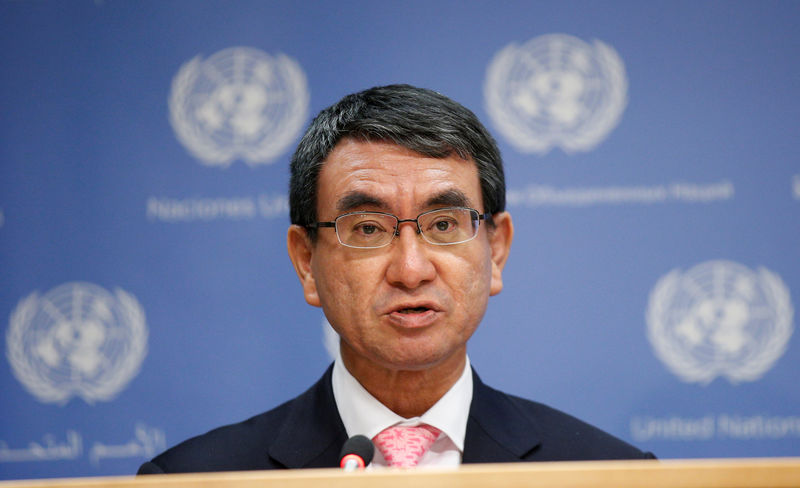 © Reuters. Japan’s Foreign Minister Taro Kono speaks during a news conference at U.N. headquarters in New York City
© Reuters. Japan’s Foreign Minister Taro Kono speaks during a news conference at U.N. headquarters in New York CityBy Michelle Nichols and David Brunnstrom
UNITED NATIONS/WASHINGTON (Reuters) – The United States has called on the U.N. Security Council to blacklist 10 ships for circumventing sanctions on North Korea, documents showed on Tuesday, while South Korea’s President suggested curtailing military exercises with Washington to ease tensions ahead of next year’s Winter Olympics.
Documents seen by Reuters said the 10 vessels had been conducting ship-to-ship transfers of refined petroleum products to North Korean vessels or transporting North Korean coal in violation of U.N. sanctions imposed over Pyongyang’s nuclear and missile programs.
The ships would be blacklisted – meaning countries would be required to ban them from entering their ports – if none of the 15 members of the Security Council’s North Korea sanctions committee object by Thursday afternoon.
North Korea is under a U.N. arms embargo and the Security Council has banned trade in exports such as coal, textiles, seafood, iron and other minerals to choke funding for Pyongyang’s missile and nuclear programs.
In September, the council put a cap of 2 million barrels a year on refined petroleum products exports to North Korea.
The ships targeted for blacklisting were Xin Sheng Hai (flag unknown); the Hong-Kong-flagged Lighthouse Winmore; the Togo-flagged Yu ; Panama-flagged Glory Hope 1 (also known as Orient Shenyu), Kai Xiang, and Billions No. 18; and the North Korean-flagged Ul Ji Bong 6, Rung Ra 2, Rye Song Gang 1, and Sam Jong 2.
Four ships were designated for carrying coal from North Korea by the council’s North Korea sanctions committee in October.
The United States has led a drive to step up sanctions on North Korea in response to Pyongyang’s efforts to develop nuclear-tipped missiles capable of hitting the United States.
In Ottawa on Tuesday, Canada and the United States said they would co-host a foreign ministers meeting in Vancouver on Jan. 16 to demonstrate international solidarity against North Korea’s nuclear and missile tests. Representatives of the countries that sent troops or other military support to the U.N.-backed effort to repel North Korean forces after the 1950 invasion of South Korea will attend.
Japan, India and Sweden will also attend, U.S. Secretary of State Rex Tillerson said.
“We can’t talk unless North Korea is ready to talk,” Tillerson told reporters after meeting with Canadian Foreign Affairs Minister Chrystia Freeland.
“What’s important for North Korea to know is that this pressure campaign will not abate, we will not be rolling any of it back, it will only be intensified as time goes by, and it will remain in place until they agree to give up their nuclear weapons and allow us to verify the fact that is what they have done,” he said.
Freeland said the world had to demonstrate to North Korea that it was united in condemning Pyongyang’s actions.
“The international pressure campaign – we believe it’s going to be successful, and a successful outcome of the international pressure campaign is a diplomatic engagement,” Freeland said.
Washington has warned that all options are on the table, including military ones, to prevent North Korea’s missile development.
On Friday, Tillerson had urged North Korea to carry out a “sustained cessation” of weapons testing to allow the two countries to hold talks.
North Korea paused its missile testing for more than two months before firing a new type of intercontinental ballistic missile in late November.
U.S. officials say it has given no indication it is willing to discuss giving up its nuclear program and Pyongyang has repeatedly denounced U.S. and South Korean military drills, which it says are a prelude to invasion.
On Tuesday, South Korean President Moon Jae-in said he was willing to ease tensions ahead of next year’s Winter Olympics in South Korea by curtailing joint military exercises.
“It is possible for South Korea and the U.S. to review the possibility of postponing the exercises,” he told NBC News. “I’ve made such a suggestion to the U.S., and the U.S. is currently reviewing it. However, all this depends on how North Korea behaves.”
A spokesman for the U.S. Pacific Command, Commander Dave Benham, declined to discuss any plans for exercises.
Earlier on Tuesday, Japan and South Korea, both U.S. allies, urged China to put more pressure on North Korea.
Japanese Foreign Minister Taro Kono said after talks with South Korean Foreign Minister Kang Kyung-wha that China – North Korea’s neighbor and only big ally – was implementing Security Council resolutions but could do more.
China routinely says it is meeting its U.N. obligations on North Korea and has urged “all sides” to pursue dialogue.
The U.S. Navy’s top officer, Chief of Naval Operations Admiral John Richardson, said on Tuesday that vessels from the eastern Pacific could be moved to reinforce U.S. naval power in Asia as Washington contends with increased threats in the region and accidents that have weakened its maritime force.
China has been irritated by stepped-up U.S. naval deployments in the Pacific and along with Russia has proposed that Washington and Seoul halt major military exercises in exchange for North Korea freezing its weapons programs.
Washington has warned North Korea it would be “totally destroyed” in the event of war and on Monday U.S. President Donald Trump unveiled a new national security strategy stressing the need to deal with the challenge posed by Pyongyang.
This week Washington publicly blamed North Korea for a massive worldwide cyber attack in May that crippled hospitals, banks and other companies. A White House official said on Tuesday that Facebook Inc (NASDAQ:) and Microsoft Corp (NASDAQ:) disabled a number of North Korean cyber threats last week.
Researchers say a series of cyber attacks has netted North Korean hackers millions of dollars in virtual currencies like bitcoin, with more attacks expected, as international sanctions drive the country to seek new sources of cash.
Source: Investing.com


























